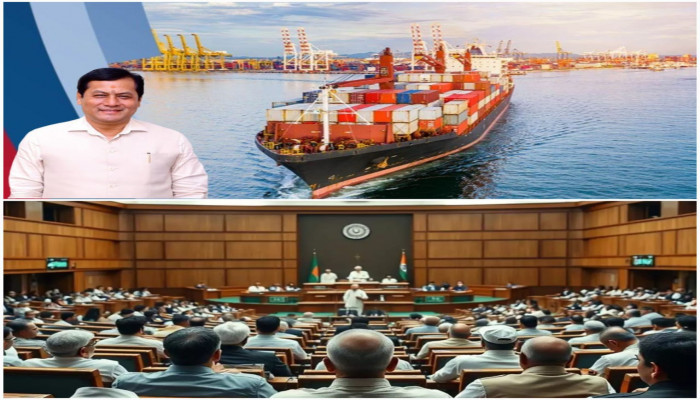Lok Sabha passes Coastal Shipping Bill 2024 to boost maritime trade
- In Reports
- 03:55 PM, Apr 04, 2025
- Myind Staff
On Thursday, the Lok Sabha approved the Coastal Shipping Bill 2024, marking a notable milestone in transforming India’s maritime industry. The legislation establishes a dedicated legal framework for coastal trade to make transportation more cost-effective, dependable, and sustainable. By promoting coastal shipping, the bill also seeks to reduce the burden on the country’s heavily congested road and rail networks. Union Minister of Ports, Shipping, and Waterways Sarbananda Sonowal highlighted the bill’s strategic significance: "The Bill seeks to unlock the full potential of India’s vast and strategic coastline, providing a dedicated legal framework for coastal trade.”
The Coastal Shipping Bill 2024 aims to modernise and simplify India's coastal trade while aligning with the National Logistics Policy envisioned by Prime Minister Narendra Modi. The bill introduces updated provisions to integrate coastal trade into the overall logistics network, strengthening India’s maritime sector. It seeks to address shortcomings in previous laws, including the Merchant Shipping Act of 1958, by introducing new regulations for licensing and overseeing foreign vessels operating in Indian coastal waters. Additionally, the bill proposes developing a National Coastal and Inland Shipping Strategic Plan and establishing a National Database for Coastal Shipping.
Sarbananda Sonowal elaborated on the bill’s more expansive impact: "The overarching goal of the Bill is to develop a coastal fleet owned and operated by Indian entities. This will reduce our dependence on foreign vessels and significantly lower logistics costs, promote green transport, and create thousands of jobs in shipbuilding, port services, and vessel manning.”
Coastal shipping is set to play a crucial role in lowering logistics costs and promoting eco-friendly transport. The new bill includes measures to simplify Indian ships' participation in coastal trade. One significant change is removing the general trading license requirement for Indian vessels, reducing regulatory hurdles and making business operations smoother. Under the new regulations, foreign ships will need special licenses from the Director General of Shipping to operate in coastal trade. This move aims to boost domestic shipbuilding and create job opportunities for Indian seafarers, which aligns with the “Make in India” initiative. Additionally, the bill requires developing a National Coastal and Inland Shipping Strategic Plan to keep the sector competitive and aligned with India’s long-term economic goals.
The Coastal Shipping Bill 2024 aims to modernise and simplify coastal trade regulations. Union Minister Sarbananda Sonowal explained, “The new Coastal Shipping Bill modernises and streamlines coastal trade regulations, addressing gaps in the Merchant Shipping Act, 1958. Unlike its predecessor, which focused solely on vessel licensing, this Bill provides a holistic framework aligned with global cabotage practices.”
The bill also introduces key strategic measures such as priority berthing for coastal vessels, streamlined green clearance procedures, and reduced GST on bunker fuel. Over the past decade, coastal cargo traffic has seen a significant 119% increase, rising from 74 million tonnes in 2014-15 to 162 million tonnes in 2023-24. With a target of reaching 230 million tonnes by 2030, these reforms are essential to strengthening India’s maritime sector and ensuring its continued growth. An important aspect of the Coastal Shipping Bill is its focus on connecting coastal shipping with inland waterways. Sonowal highlighted, “The integration of coastal and inland waterways will promote regional development of riverine and coastal areas alike. This Bill will also provide long-term growth for coastal and inland waterways transport in states such as Odisha, Karnataka, and Goa.”
The bill promotes inclusive growth in coastal shipping by encouraging collaborative planning. It ensures that States and Union Territories are actively involved in shaping strategies and route development, reinforcing the spirit of cooperative federalism. The bill introduces a National Database for Coastal Shipping to improve transparency and coordination, enabling data-driven decision-making. Additionally, it broadens the list of entities eligible to charter foreign vessels, including Indian citizens, NRIs, OCIs, and LLPs. This expansion allows a more diverse group of stakeholders to participate in India’s growing coastal shipping industry.
Responding to concerns raised by opposition parties, Sarbananda Sonowal stressed that the bill is based on cooperative federalism. He stated, “The Coastal Shipping Bill, 2024 upholds cooperative federalism by ensuring the active participation of States and Union Territories.”
As per Clause 8(3), a committee of representatives from primary ports, State Maritime Boards, and experts will be responsible for drafting the National Coastal and Inland Shipping Strategic Plan. This provision ensures that States have a straightforward role in shaping the country’s coastal shipping strategy.
Linking coastal shipping with inland waterways opens up new opportunities for regional development and economic expansion, especially in states with riverine and coastal access. The bill acknowledges the importance of state participation in this process, promoting a cooperative and inclusive approach to maritime growth while aligning with India’s broader development objectives.







Comments